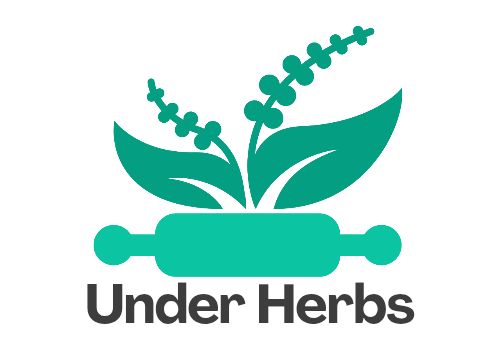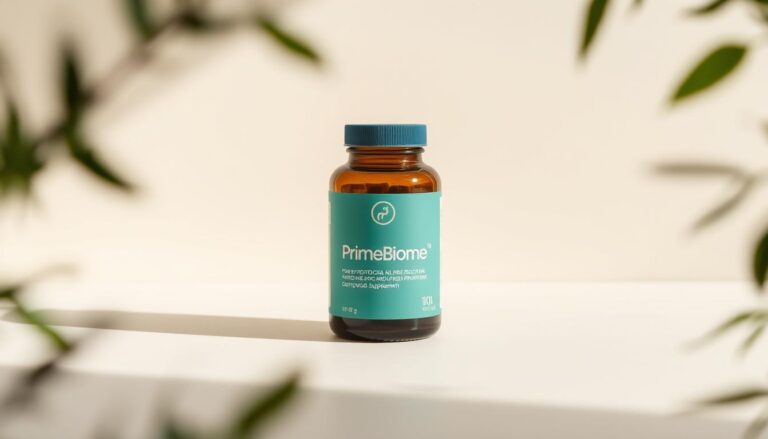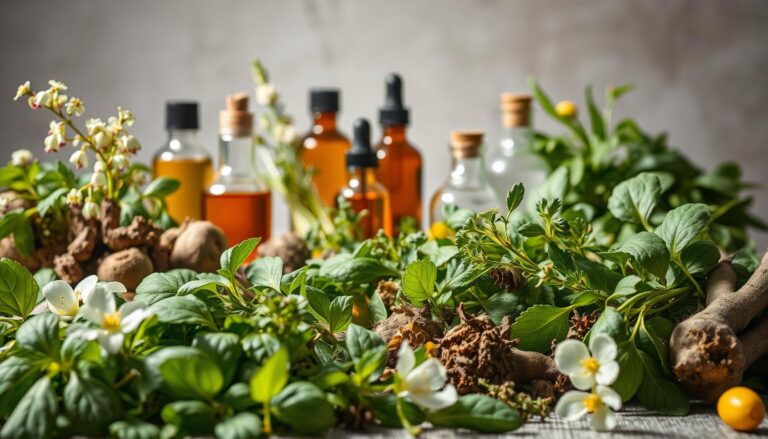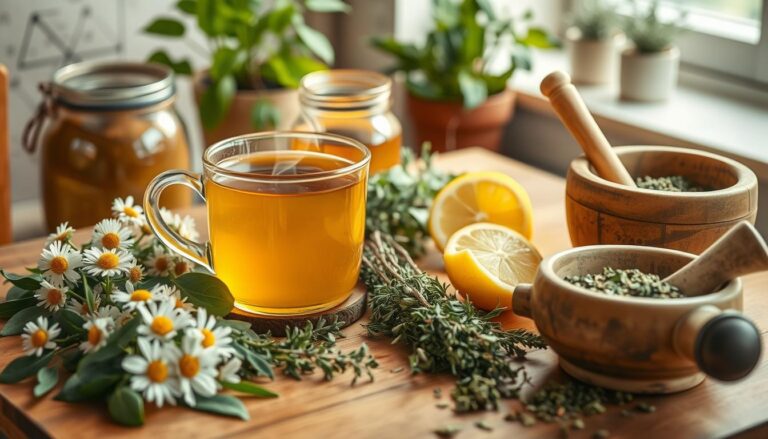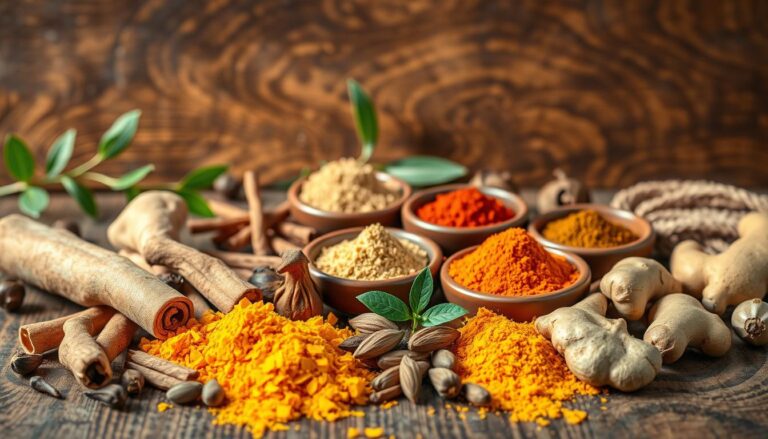Evidence-Based Herbal Treatments: Discover Natural Remedies
Are you looking for new ways to stay healthy or treat health issues? Natural remedies have been around for centuries. They are becoming more popular than ever.
Herbal supplements are used to help with health problems. You might wonder if they really work. The secret is in using them in an evidence-based way.

Many people are choosing natural remedies to add to their health plans. As we dive into herbal supplements, it’s key to see their role in health and treating conditions.
Key Takeaways
- Herbal supplements are used to treat diseases or maintain health.
- Natural remedies have been used for centuries and are gaining popularity.
- Understanding evidence-based approaches is crucial for effective use.
- Herbal supplements can complement traditional health regimens.
- It’s essential to explore the role of herbal supplements in health maintenance.
The Science Behind Herbal Medicine
Exploring herbal remedies means diving into the science that proves they work. Herbal medicine has a long history, passed down through generations. But, modern research is adding a new level of proof to these old practices.
How Traditional Knowledge Meets Modern Research
Traditional medicine comes from the beliefs and experiences of different cultures. Now, modern research is backing up some of these old ways with new studies. For example, systematic reviews and meta-analyses of randomized clinical trials are showing that some herbal medicines really do work.
Combining traditional knowledge with modern research brings many benefits. These include:
- Deeper understanding of herbal remedies
- Proof of traditional practices through science
- New treatments based on ancient wisdom
Understanding Clinical Evidence Hierarchies
Clinical evidence hierarchies are important for judging herbal treatments. At the top are systematic reviews and meta-analyses, which give a full view of the evidence. Knowing these hierarchies helps you choose herbal remedies wisely.
Evidence-Based Herbal Treatments for Inflammation
Medicinal herbs are becoming more popular for fighting inflammation. This is thanks to scientific studies and old wisdom. You can use integrative medicine by adding plant-based treatments to your routine.

Turmeric (Curcuma longa) for Arthritis and Inflammatory Conditions
Turmeric, especially its curcumin, is well-studied for fighting inflammation. It might help with arthritis and other inflammatory issues. Effective dosages and ways to make it more available are key to its benefits.
Effective Dosages and Bioavailability Enhancers
For the best results, take 1.5 to 2 grams of curcumin extract daily. To make it work better, eat it with piperine (black pepper extract) or fatty meals.
Boswellia for Joint Health
Boswellia, or frankincense, is known for its anti-inflammatory effects, especially for joints. Research shows boswellic acids can cut down inflammation and ease symptoms in osteoarthritis.
- Reduces inflammatory markers
- Improves joint mobility
- May alleviate pain
Ginger’s Anti-inflammatory Properties
Ginger is famous for its anti-inflammatory compounds like gingerols and shogaols. It can help lower inflammation and pain. Adding ginger to your diet is a smart move for fighting inflammation.
- Consume ginger fresh or as a supplement
- Combine with other anti-inflammatory herbs for enhanced benefits
Herbal Remedies for Mental Health with Scientific Support
Herbal remedies have been used for centuries to help with mental health. Recent studies have shown they can be effective. They can be a good addition to your mental health support.
St. John’s Wort for Depression: The Research Evidence
St. John’s Wort (Hypericum perforatum) has been studied a lot for depression. It might work as well as some antidepressants for some people. But, always talk to a doctor before trying it.
Important Medication Interactions
St. John’s Wort can affect how other medicines work. This includes antidepressants, blood thinners, and HIV drugs. It’s important to tell your doctor about any supplements you’re taking.
Ashwagandha for Anxiety and Stress
Ashwagandha (Withania somnifera) is known for reducing anxiety and stress. It can also help with sleep and thinking better. Key benefits include:
- Reduced cortisol levels
- Improved anxiety and stress scores
- Enhanced cognitive function
Bacopa Monnieri for Cognitive Function
Bacopa Monnieri (Bacopa monnieri) helps with memory and thinking. Research shows it can improve memory and brain function. Notable benefits include:
- Improved memory recall
- Enhanced cognitive processing speed
- Neuroprotective effects
These herbal remedies are promising for mental health support. Always talk to a healthcare professional before adding them to your routine.
Clinically-Validated Herbs for Heart and Circulatory Health
Heart health is crucial, and natural herbs can help. In the world of alternative medicine and integrative medicine, some medicinal herbs are known for their heart benefits.

Hawthorn for Cardiovascular Support
Hawthorn is known for supporting heart health. Research has shown it can improve heart function, especially in heart failure patients. It may also boost cardiac output and lessen heart failure symptoms.
Garlic’s Effects on Cholesterol and Blood Pressure
Garlic is famous for its heart health benefits. Studies confirm it can lower cholesterol and blood pressure. These changes can reduce heart disease risk.
Ginkgo Biloba for Circulation and Memory
Ginkgo Biloba is known for boosting memory and blood flow. It may also help lower heart disease risk. This is because it improves circulation.
These herbs, supported by research, can help with heart and circulatory health. Always talk to a doctor before adding them to your routine. This is especially true if you’re on medication or have health issues.
Immune-Boosting Herbs with Research Backing
Using plant-based medicine can help boost your immune system, studies show. The world of herbal remedies is wide, with many herbs known for their immune benefits. This part looks at the science behind some herbs that help keep your immune system strong.

Echinacea: Separating Fact from Fiction
Echinacea is a top choice for boosting immunity. But, research has mixed results, showing the need to know about species and preparation methods. Some studies say that certain Echinacea types can make colds shorter and less severe.
Species Differences and Preparation Methods
Echinacea’s effectiveness changes with the species and how it’s made (extracts, capsules, or teas). This shows why it’s key to have standard herbal products for consistent benefits.
Elderberry for Viral Infections
Elderberry is known for fighting viral infections, and studies are backing it up. Its anthocyanins might help lessen flu symptoms.
Astragalus for Long-term Immune Support
Astragalus membranaceus is used in traditional Chinese medicine for boosting immunity. Research shows it can help immune cells work better, making it a solid choice for evidence-based medicine.
Adding these herbal remedies to your routine might boost your immune system. But, always talk to a healthcare expert before starting any new supplements, especially with other treatments.
Sleep and Relaxation: Evidence-Based Natural Solutions
Looking for ways to improve your sleep and relaxation? There are natural solutions backed by science. These can help you get a good night’s sleep and feel more relaxed during the day.
One effective solution is to try herbal supplements. These supplements are made from plants and can help calm your mind and body. They can be a great alternative to traditional sleep aids.
Another option is to explore integrative medicine. This approach combines traditional medicine with natural therapies. It can help you find a holistic way to improve your sleep and overall well-being.
By incorporating these natural solutions into your routine, you can enhance your sleep and relaxation. They offer a safe and effective way to improve your quality of life.
Benefits of Natural Solutions for Sleep and Relaxation
Using natural remedies for sleep and relaxation can have several benefits. They can help you:
- Improve the quality of your sleep
- Reduce stress and anxiety
- Enhance your overall well-being
These natural solutions can be a great addition to your self-care routine. They offer a holistic approach to improving your sleep and relaxation.
Digestive Health: Herbs with Clinical Support
Keeping your digestive system healthy is key to feeling good. Some herbal remedies have been proven to help. You can count on these medicinal herbs to aid your digestive health.
Peppermint Oil for IBS: Clinical Trial Results
Peppermint oil is great for easing IBS symptoms. Studies show it cuts down on stomach pain and improves bowel movements. Its menthol relaxes stomach muscles, offering relief.
Milk Thistle for Liver Protection and Function
Milk thistle is a plant-based medicine that boosts liver health. Its silymarin protects liver cells and helps them grow back. It’s a top herbal remedy for liver health.
Slippery Elm and Marshmallow Root for Gut Healing
Slippery elm and marshmallow root soothe the gut. They have mucilages that shield the digestive tract’s lining. This reduces inflammation and aids in healing. They’re often paired for better gut health support.
Personalized Approach to Herbal Medicine
Personalization is key to unlocking the full potential of herbal medicine for your health. As research continues, it’s clear that a one-size-fits-all approach doesn’t work.
Several factors affect how well herbal medicine works. Genetic factors, for example, play a big role in how your body processes herbal supplements.
Genetic Factors Affecting Herbal Treatment Efficacy
Your genetic makeup can change how you metabolize certain herbs. This affects their effectiveness and potential side effects. For example, genes that control drug metabolism can impact how your body processes compounds in St. John’s Wort or Ginkgo Biloba.
Age, Gender, and Health Status Considerations
Age, gender, and health status are also important. Older adults may need adjusted dosages because of slower metabolism and potential interactions with other medications. Pregnant or breastfeeding women should be careful with certain herbs that could affect the fetus or baby.
Integrating Herbs with Your Current Health Regimen
When adding herbal supplements to your health regimen, think about any existing health conditions and medications. Some herbs can interact with pharmaceuticals or worsen health issues if not used correctly.
| Factor | Consideration | Example |
|---|---|---|
| Genetic Factors | Metabolism of Herbs | St. John’s Wort efficacy varies with genetic differences in drug metabolism genes. |
| Age | Dosage Adjustments | Older adults may need lower doses of Ginkgo Biloba due to reduced metabolism. |
| Gender | Health Status and Pregnancy | Certain herbs are contraindicated during pregnancy, such as Ginseng. |
By considering these factors and consulting with healthcare professionals, you can create a personalized herbal medicine plan. This plan will complement your existing health regimen and maximize the benefits of evidence-based herbal treatments.
Quality and Safety: Maximizing Benefits of Herbal Treatments
Adding herbal supplements to your health routine is great. But, it’s key to make sure they’re of high quality and safe. The quality can really affect how well they work and how safe they are.
Many things can make herbal treatments better or worse. These include standardization, third-party testing, and rules from regulators.
Understanding Standardization and Extract Potency
Standardization means herbal supplements have the same amount of active parts. Extract potency is also important because it determines how well the supplement works. Choose products that clearly show the extract ratio and potency.
Third-Party Testing and Quality Certifications
Third-party testing checks if herbal supplements are pure and of good quality. Certifications from groups like NSF International show a product meets certain standards. Always check for these certifications when picking herbal supplements.
Regulatory Framework in the United States
In the U.S., herbal supplements are mainly watched by the FDA. The Dietary Supplement Health and Education Act (DSHEA) guides this. Even though the FDA doesn’t approve supplements before they’re sold, it can act if a product is unsafe.
To get the most from herbal treatments, remember these important points:
- Make sure the product is standardized and has clear labeling about extract potency.
- Look for third-party testing and quality certifications.
- Know the rules and if the maker follows them.
Conclusion: Embracing Evidence in Natural Medicine
Exploring herbal treatments shows how important evidence-based medicine is. It helps prove that plant-based medicine works. By mixing old wisdom with new research, you can choose wisely for your health.
Herbal remedies can be a great part of your health care. Knowing the science behind them and their quality and safety is key. Herbs like turmeric, ginger, St. John’s Wort, and ashwagandha have shown to help with many health issues. Using evidence-based herbal treatments can help you take care of your health.
The world of natural medicine is always changing. It’s important to keep up with new research and findings. This way, you can use plant-based medicine to improve your health and well-being. Whether you’re looking for help with inflammation, anxiety, or digestive problems, herbal treatments can be a good option.
FAQ
What are evidence-based herbal treatments?
Evidence-based herbal treatments are plant-based remedies backed by science. They help keep you healthy and treat various conditions.
How do I know if an herbal supplement is safe to use?
Check if the supplement has been tested by third parties and has quality certifications. Always talk to a healthcare professional before adding new supplements, especially if you’re on medications.
Can herbal remedies interact with my prescription medications?
Yes, some herbal remedies can affect your medications. For example, St. John’s Wort can change how antidepressants work. Ginkgo Biloba might affect blood thinners. Always check with a healthcare professional before mixing herbal remedies with your medications.
What is the importance of standardization in herbal treatments?
Standardization means the herbal product has a consistent amount of active ingredients. This is key for both safety and effectiveness. Look for products that clearly state the extract potency and standardization.
Are there any herbal remedies that can help with anxiety and stress?
Yes, Ashwagandha can help with anxiety and stress. But, it’s important to talk to a healthcare professional before using it, especially if you’re on medications or have health issues.
How can I integrate herbal remedies with my current health regimen?
Consider your genetic makeup, age, gender, and health when adding herbal remedies. A healthcare professional can help find the right herbal remedies for you. They can also check for safe interactions with your current medications.
What are some evidence-based herbal treatments for inflammation?
Turmeric, Boswellia, and Ginger are good for reducing inflammation. Turmeric has curcumin, which fights inflammation well. Boswellia supports joint health.
Can herbal remedies help with sleep and relaxation?
Yes, Valerian Root, Passionflower, and Lemon Balm with Chamomile can help relax and improve sleep.
Are there any herbal remedies that can support heart and circulatory health?
Yes, Hawthorn, Garlic, and Ginkgo Biloba are good for heart and circulatory health. Hawthorn may lower blood pressure. Garlic can help with cholesterol.
How do I choose a high-quality herbal supplement?
Look for supplements that have been tested by third parties and have quality certifications. Make sure they clearly state the extract potency and standardization. Also, get recommendations from a healthcare professional.
